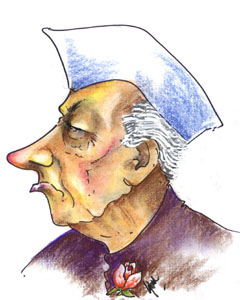 Jawaharlal Nehru was the first Prime Minister of independent India,
Jawaharlal Nehru was the first Prime Minister of independent India,
having led the freedom struggle from the front along with Mahatma
Gandhi. Born in an affluent Kashmiri family, Nehru spent his youth
acquiring an education in the best schools and colleges in England
and returned to India very much an Englishman and became a
lawyer. But a chance encounter with General Dyer, the architect of
the Jalliawalan Bagh massacre, hearing him boast about the
incident, converted Nehru into a rebel committed to freeing India
from British rule. He started his political career in the United
Province (now Uttar Pradesh) and in a little over 10 years, he was
elected as the President of the Congress, a position he was to hold
five times. His belief in socialist principles led him, in association
with others, to establish the left wing of the Congress party. Nehru
was a voracious reader and a prolific writer and his political thought
was influenced by thinkers like Mill, Gladstone and Morley. The
biggest impact on him was of Gandhi and he reciprocated by
anointing Nehru as his successor. Nehru led the country to
independence and guided it through the turbulence of Partition,
which, many critics point out, was in many ways a problem of his
own making. As Prime Minister, he was instrumental in developing
India's industry and infrastructure, which reflected his belief in
science and technology. Nehru's socialism also envisaged Five
Year Plans to regulate economic growth and development of the
country's resources in an organised manner. He also brought in India
onto the world map, with his leadership in international issues. By
the time he died in office in 1964, Nehru had been the Prime
Minister for 17 years. Though he left many tasks
unfinished-Pakistan's estrangement with India, tension with China, a
festering communal problem, rampant poverty-Nehru remains one of
the most adored and idolised leaders of India.
Back to Home
Geocities.com
Email